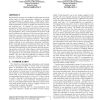Free Online Productivity Tools
i2Speak
i2Symbol
i2OCR
iTex2Img
iWeb2Print
iWeb2Shot
i2Type
iPdf2Split
iPdf2Merge
i2Bopomofo
i2Arabic
i2Style
i2Image
i2PDF
iLatex2Rtf
Sci2ools
IIR
2010
2010
Context-Dependent Recommendations with Items Splitting
Recommender systems are intelligent applications that help on-line users to tackle information overload by providing recommendations of relevant items. Collaborative Filtering (CF) is a recommendation technique that exploits users' explicit feedbacks on items to predict the relevance of items not evaluated yet. In classical CF users' ratings are not specifying in which contextual conditions the item was evaluated (e.g., the time when the item was rated or the goal of the consumption). But, in some domains the context could heavily influence the relevance of the item and this must be taken into account. This paper analyzes the behavior of a technique which deals with context by generating new items that are restricted to a contextual situation. The ratings' vectors of some items are split in two vectors containing the ratings collected in two alternative contextual conditions. Hence, each split generates two fictitious items that are used in the prediction algorithm inst...
Related Content
| Added | 29 Oct 2010 |
| Updated | 29 Oct 2010 |
| Type | Conference |
| Year | 2010 |
| Where | IIR |
| Authors | Linas Baltrunas, Francesco Ricci |
Comments (0)

